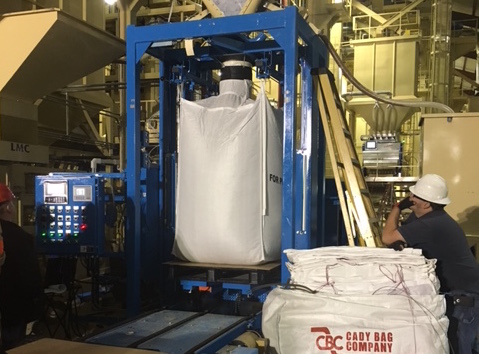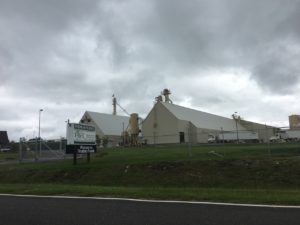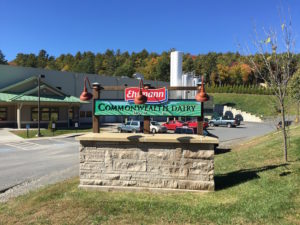
By Leah B. Thibault, CEI Capital Management
It’s one thing to be the kind of company that people want to work for – maybe you offer competitive pay, good benefits, and a great working environment. It’s another thing to be the kind of company other companies want to sell to because, in addition to getting a fair price, the suppliers’ jobs get better too.
Two food processors – Premium Peanut and Ehrmann Commonwealth Dairy – have this baked into their business models. They consider more than the good jobs on their direct payroll by looking to shared prosperity throughout their supply chains.
More than peanuts
 Douglas, Georgia is about 116 miles north of Tallahassee, 200 miles south of Atlanta, and closer to the Okefenokee Swamp than any major urban area. An unlikely place, perhaps, to locate the largest single peanut shelling facility in the world. But in 2014, the newly formed Premium Peanut did just that.
Douglas, Georgia is about 116 miles north of Tallahassee, 200 miles south of Atlanta, and closer to the Okefenokee Swamp than any major urban area. An unlikely place, perhaps, to locate the largest single peanut shelling facility in the world. But in 2014, the newly formed Premium Peanut did just that.
Premium Peanut has 190 employees, including 55 contract employees providing trucking and hauling services. Each of the direct jobs pays a living wage and benefits in an area that had a 9% unemployment rate and where nearly 29% of the local population had an income below the poverty line at the time the project began. As wonderful as these newly created jobs have been, the biggest impact of the company’s operations comes a step down the supply chain with the peanut farmers.
Like with many heavily commoditized food products, peanut farming in Southern Georgia is an exercise in leaps of faith and short-term planning. Typically, contracts between growers and processors last no more than one year and vary widely in availability and pricing from one year to the next. This creates uncertainty in the farmer’s revenue stream, making it difficult to plan for crop rotation, capital needs, and other issues.
If Premium Peanut’s business plan is to shell and process peanuts, it’s raison d’etre is to support Southern Georgia’s peanut farmers. Though not a formal co-op, Premium Peanuts counts over 260 farmers in 28 counties across South Georgia as shareholders. While being a shareholder in Premium Peanut doesn’t necessarily mean the farmers get paid more for their crop, it does give them something that can be even more valuable – stability.
As Karl Zimmer, Premium Peanut’s CEO, says, “With us, they know that if they bought a thousand shares of the company, they have a home for a thousand tons of farmers’ stock peanuts every year. We will buy them, we will warehouse them. They know they will get 100% of the value for that product, whether they get it as an upfront payment, at harvest, which we call an option payment, or they get it at the end of the year as a dividend of the profits that we make.”
That stability can make the difference between buying a new harvester or struggling with the worn-out one on hand. Shareholder farmer Elton Brooks explained, “I can plan ahead four or five years and know where I’ll have peanuts five years from now. It’s made me feel better about going out and buying several hundred thousand dollars’ worth of new equipment.”
Milk money
 In Brattleboro, Vermont, dairy farmers face similar issues. Dairy farms have always been a major part of Vermont’s culture and economy, but economic conditions post-recession made it difficult for dairy farmers to make a living, with the number of dairy farms in the state decreasing by nearly two-thirds between 2000 and 2010. Concurrent with the loss of dairy farms was a loss of in-state dairy processors, leaving the remaining farms with limited arenas to sell their milk.
In Brattleboro, Vermont, dairy farmers face similar issues. Dairy farms have always been a major part of Vermont’s culture and economy, but economic conditions post-recession made it difficult for dairy farmers to make a living, with the number of dairy farms in the state decreasing by nearly two-thirds between 2000 and 2010. Concurrent with the loss of dairy farms was a loss of in-state dairy processors, leaving the remaining farms with limited arenas to sell their milk.
It was into this economic environment that Ehrmann Commonwealth Dairy entered in 2010. With the construction of a 32,500-square foot yogurt processing facility that increased demand for local milk by 100 million pounds per year (equivalent to the production from 4,500 cows) and farmers desperate for off-takers, Commonwealth was in the driver’s seat. While Commonwealth could have decided to look for short-term gains when dealing with its suppliers, they instead took a more holistic view that acknowledges that the sustainability of Commonwealth is dependent upon the small farms that supply its milk.
Beyond providing a stable market, Commonwealth is going the extra mile to support existing farmers, as well as encourage the next generation of dairy professionals.
Commonwealth returns 5% of its profits to the farmers who supply its milk through a grant program administered by the Farm and Forest Viability Program of the Vermont Housing and Conservation Board. As of July 2017, Commonwealth Dairy awarded $1.17 million in funds, which leveraged an additional $4.6 million from other sources. These funds went to 41 different farms, 90% of which have herds smaller than 500.
These shared profits have been used to reinvest throughout the value chain — for barn construction, milking equipment, and milking parlor renovations, among other uses. For Karie Atherton of Aires-Hill Farm, it meant adding grooved cement floors in her barn and milking parlor, preventing further loss of cows due to injuries. Not only is animal well-being improved, but the project has also made a big difference in her business.
“It just goes to show you, little things can really improve your cash flow because you’re not losing cows,” Atherton said. “I wish I would have done the project sooner. I knew there would be a difference, but I didn’t realize it would be so dramatic.” And Atherton isn’t alone. The 15 completed projects have resulted in an average increase in gross income of $18,351 per farm.
These processors’ commitment to supporting quality jobs up and down the supply chain, along with their location in a federally-defined low-income census tract have additional benefits. Those attributes made them eligible for low-cost flexible financing from CEI Capital Management – a Maine-based organization that prioritizes the creation of quality jobs, environmentally sustainable enterprises, and shared prosperity in rural regions across the United States. For holistically-thinking companies like Premium Peanut and Ehrmann Commonwealth Dairy, a financing partnership with a mission-driven organization like CEI Capital came when they couldn’t raise capital from conventional sources. Recognizing their mission and their aim to share their prosperity in the community opened financial flexibility and tools to make those supply chain impacts possible.
 Leah B. Thibault is Director of Executive Administration and Special Projects for CEI Capital Management. The company creates and preserves jobs and improves quality of life in rural, low-income communities by providing access to project capital through New Markets Tax Credits. Over 12 years, CEI Capital Management has placed over $924 million in 90 different projects across the U.S. In addition to fiscal soundness, CEI Capital Management evaluates each project according to its benefit to the local community, economic gain and positive impact on the environment. It is a wholly owned subsidiary of Coastal Enterprises, Inc. (CEI), the Maine-based nonprofit community development financial institution that was among the founders of this important federal economic development program.
Leah B. Thibault is Director of Executive Administration and Special Projects for CEI Capital Management. The company creates and preserves jobs and improves quality of life in rural, low-income communities by providing access to project capital through New Markets Tax Credits. Over 12 years, CEI Capital Management has placed over $924 million in 90 different projects across the U.S. In addition to fiscal soundness, CEI Capital Management evaluates each project according to its benefit to the local community, economic gain and positive impact on the environment. It is a wholly owned subsidiary of Coastal Enterprises, Inc. (CEI), the Maine-based nonprofit community development financial institution that was among the founders of this important federal economic development program.





